Did you know that the German Shepherd has consistently ranked as one of the most popular dog breeds in many countries for decades? It’s easy to see why! Yet this breed of dog also has specific dietary requirements essential for long-term health. Providing your German Shepherd with premium German Shepherd food is the most direct way to ensure the health of your German Shepherd and support their active lifestyle.
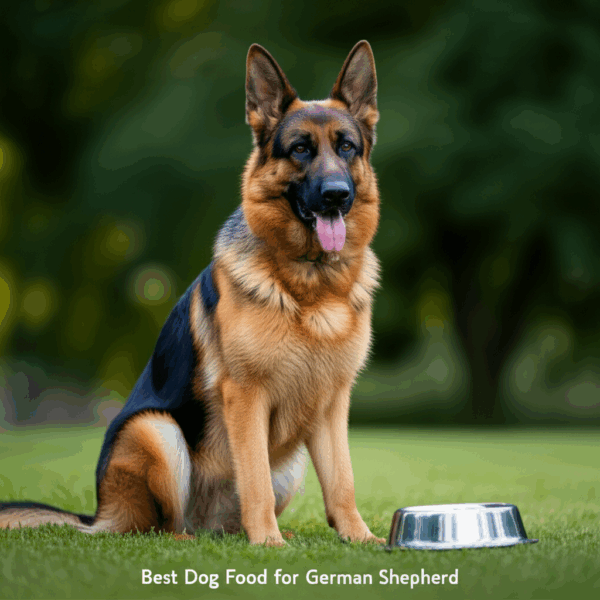
This guide explains the best food for a German Shepherd, including nutrients, feeding schedules, and common health issues. Our goal is to help you discover the best dog food products tailored to the unique needs of your German Shepherd.
Why Choosing the Best Food for a German Shepherd Matters
German Shepherd Health: Why Nutrition is Critical for This Breed Dog
Moreover, their energy and intelligence require premium pet food to provide the energy your dog needs. Without proper nutrition, the health of your German Shepherd may decline—manifesting as a dull coat, low energy, or digestive upset.
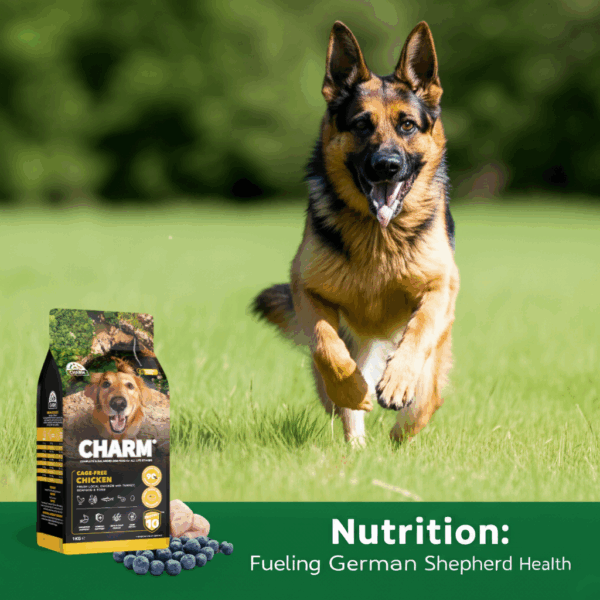
Furthermore, their high intelligence and energy levels require premium fuel. The energy your dog needs to excel in training, work, or play comes directly from the nutrients in their food. A subpar diet can lead to lethargy, a dull coat, and a weakened immune system, preventing your German Shepherd from living life to the fullest.
What is the Best Food for German Shepherds?
The best food for German Shepherds is one that is rich in high-quality animal protein, contains healthy fats for energy and coat health, and is low in carbohydrates and unnecessary fillers. Avoid filler-heavy diets. For many, a German Shepherd adult dry dog food with meat-first ingredients is ideal.
Look for formulas that include functional ingredients designed to support the breed’s specific needs, like glucosamine for joints and antioxidants for immune health. For example, CHARM®’s Cage-Free Chicken Dry food is rich in protein and low in carbs, such adult dog food ensures nutrients from their food go directly toward muscle, joint, and immune support—exactly what adult German Shepherds need.
What is the Best Food to Give a German Shepherd Dog?
Ultimately, the best food to give a German Shepherd dog is the one that helps them maintain a lean body condition, a shiny coat, and consistent energy levels. There is no single “best” brand for every dog, but the best dog foods share common characteristics: transparency in sourcing, high-quality ingredients, and a formulation grounded in nutritional science. Your German Shepherd might thrive on a beef-based recipe while another does better with chicken or lamb.
High-quality dog food products provide the energy your dog needs, ensuring complete dog nutrition. Whether chicken, lamb, or beef, food provides the essential vitamins and minerals required for the health of your German Shepherd.
German Shepherd Food | What Nutrients Does a German Shepherd Need Daily?
German Shepherd Food: What Should a German Shepherd Eat in a Day?
A German Shepherd should eat a carefully balanced diet of high-quality proteins, healthy fats, and specific vitamins and minerals each day. Their daily intake needs to be sufficient to fuel their active lifestyle while supporting their unique physiological needs, such as strong bones and a robust immune system. The exact amount of food depends on their age, weight, and activity level, so it’s essential to always follow the feeding guide on the packaging and adjust portion accordingly.
This breed of dog benefits immensely from nutrient-dense food, where every ingredient serves a purpose. Avoid foods with empty fillers like corn, wheat, or soy, as these provide little nutritional value and can sometimes cause digestive upset. Instead, every calorie your German Shepherd consumes should contribute to their well-being.
Dog Nutrition: Core Nutrients Like Protein, Fats, and Fiber
The core of German Shepherd nutrition revolves around several key components. A well-formulated German Shepherd food will provide these in optimal balance to ensure your German Shepherd receives everything they need to flourish.
| Nutrient | Role | Sources |
|---|---|---|
High-Quality Protein | Supports and maintains strong, lean muscle mass; crucial for this active dog breed. | Grass-fed beef, Cage-free chicken, Grass-fed lamb, Farm-raised duck. |
Healthy Fats | Food helps provide energy your dog needs; promotes healthy skin and a shiny coat. | Chicken fat, Krill oil (a potent source of Omega-3 fatty acids). |
Collagen & Glucosamine | Essential for supporting joint health and mobility, critical for a breed prone to dysplasia | Collagen peptides, Glucosamine hydrochloride. |
Antioxidants | Boosts the immune system and helps fight oxidative stress. | Blueberries, Cranberries, and Functional mushrooms like Reishi, Turkey tail, and Chaga mushrooms. |
Calcium & Phosphorus | Strengthens bones and teeth; the ratio between them is critical for large breeds. | Chicken meal, Lamb meal, and Beef meal, Carefully balanced in high-quality food formulas. |
Digestive Support | Ingredients that aid in nutrient absorption and promote a healthy gut. | Pineapple, Artichoke hearts, and Spinach. |
Protein Portions: How Much Chicken for a German Shepherd?
If feeding adult dog food like CHARM®’s Cage-Free Chicken Dry food, the chicken is already balanced in the recipe.
If you are supplementing their diet with cooked chicken, it should be given as a treat and make up no more than 10% of their total daily caloric intake. Always ensure it’s plain, boiled, and unseasoned, with all bones removed. However, relying on a professionally formulated dry dog food is the safest way to provide the energy your dog needs without risking nutritional imbalances.
Dry Dog Food vs Wet Dog Food for German Shepherds – Which is Best?
Do German Shepherds Need Wet Food?
German Shepherds do not strictly need wet dog food, especially if they are drinking enough water and eating a high-quality dry kibble. However, wet food can be beneficial in certain situations. It has a higher moisture content, which can help with hydration, and its soft texture can be more appealing to picky eaters or senior dogs with dental issues.
That said, a diet consisting solely of wet food can be less beneficial for dental health, as the abrasive action of chewing dry kibble helps reduce plaque and tartar buildup.
Can German Shepherds Just Eat Dry Food?
Yes, a German Shepherd can be perfectly healthy and thrive on a diet of only dry dog food, provided it is a high-quality, nutritionally complete formula. Dry food is convenient, cost-effective, and has significant benefits for dental hygiene. The best dry dog food is designed to be the sole source of nutrition your dog needs.
When choosing a dry food, focus on the ingredient list. The best dog food for German Shepherds will feature a high-animal-protein and low-carb recipe. This ensures the food is nutrient-dense and appropriate for a carnivore’s digestive system, providing your German Shepherd with the sustained energy they require.
Benefits of both, depending on age and health
Puppies may enjoy a little wet food for encouragement, while seniors may need it for easier chewing. Still, adult German Shepherds need primarily dry food, as food provides complete nutrients and helps keep your dog healthy. Ultimately, the best diet for your German Shepherd is one that fits their specific health profile and that they enjoy eating.
Raw Food and Best Meat Choices for German Shepherds
Is Chicken Good for a German Shepherd?
Chicken is a fantastic source of lean protein for most German Shepherds and is a primary ingredient in many high-quality dog foods. It provides essential amino acids that help build and repair muscle tissue, which is vital for such an active and powerful breed. When included as part of a balanced commercial diet, like CHARM® Cage-Free Chicken Dry food, you can be confident your dog is getting a safe and nutritionally complete meal.
However, it’s important to serve chicken safely. Raw chicken carries the risk of salmonella and other bacteria. If you choose to offer fresh chicken, it should always be cooked thoroughly without any seasoning, and all bones must be removed to prevent choking or internal injury.
What’s the Best Meat for German Shepherds?
German Shepherds typically do well with a variety of high-quality meats. The best food for a German can depend on the individual dog, but excellent options include beef, chicken, lamb, and duck. These proteins provide a rich profile of amino acids. For instance, grass-fed beef is not only a great source of protein but also rich in iron and B vitamins, as highlighted in the Real Food Taste: The Best Beef Dog Food Recipe for Your Dog guide.
Rotating proteins can also be beneficial, ensuring nutritious food that helps your dog. Offering a diet that includes different meat sources, such as CHARM®’s lineup of Grass-Fed Beef, Grass-Fed Lamb, and Farm-Raised Duck, can provide a wider range of nutrients. This variety helps ensure a well-rounded diet for your German Shepherd.
Risks and Benefits of Raw Food and Raw Diet
A raw food diet, often referred to as a BARF (Biologically Appropriate Raw Food) diet, has gained popularity among some German Shepherd owners. Proponents claim benefits such as a shinier coat, cleaner teeth, and higher energy levels. The diet typically consists of raw meat, bones, organs, and sometimes fruits and vegetables.
However, a raw diet comes with significant risks that must be carefully managed. The primary concerns are bacterial contamination (like Salmonella and E. coli) for both the dog and the humans in the household, and the risk of nutritional imbalances if the diet is not formulated correctly. An improperly balanced raw diet can lead to deficiencies or excesses in certain nutrients, which can be particularly dangerous for a large breed dog like the German Shepherd during their growth phases. If you want appropriate raw food, consult a vet to ensure your German Shepherd receives safe ratios of calcium, vitamins, and protein.
Best Food for German Shepherd Puppies – Feeding Shepherd Puppies Right
German Shepherd Puppies’ Growth Needs
Food for German Shepherd puppies must balance calcium and phosphorus for bones—and a well-balanced, all-life-stages formula can meet these needs when fed according to the package feeding guide. The puppy phase is the most critical period for a German Shepherd dog’s dog health. Choose a complete, balanced recipe formulated for all life stages that supports large-breed growth (slow, steady skeletal development) and reduces risks like hip and elbow dysplasia—issues German Shepherds are known to face.
Prioritize high-quality protein for muscle, plus DHA, an omega-3 fatty acid crucial for brain and eyes. Avoid overfeeding; excess weight strains joints and undermines German Shepherd health. Within an all-life-stages diet, emphasize portion control—always follow the feeding guide on the packaging and adjust portion accordingly—so your German Shepherd puppy can thrive.
Choosing the Best Puppy Food for Your Shepherd Puppy
Instead of a “large breed puppy”-only formula, select a complete, balanced all-life-stages recipe that’s appropriate for puppies when fed per the package guide. These types of food use appropriate fat and minerals and food contains easily digestible proteins so puppies get essential nutrients from their food. Grain-free, high-animal-protein recipes can be a strong right dog food choice—just follow feeding guide and adjust as your puppy grows.
Research shows the strong effect of puppyhood and adolescent diet on long-term health, supporting joints, digestion, and immunity. Even with an all-life-stages recipe, feed according to puppy directions on the label and adjust as your German Shepherd matures.
Best Food for Adult German Shepherds
Adult German Shepherds’ Nutrition Needs
By 18–24 months, nutrition shifts from growth to maintenance. Focus on lean-muscle support, joints, and steady energy from high-quality animal protein. Calorie needs vary by activity; monitor body condition to keep your dog lean and mobile. A balanced plan remains the best diet for performance and longevity, providing your German Shepherd with sustained strength while protecting hips and elbows. Smart feeding choices help your dog avoid preventable issues.
Best Dry Dog Food Options
Choose top dog food recipes where named meat leads the list and the food recipe is high-protein and lower-carb. For example, CHARM® Grass-Fed Lamb Dry food offers a rich inclusion of animal protein plus functional add-ins for coat, digestion, and joints—exactly how dry dog food is designed to support German Shepherd nutrition.
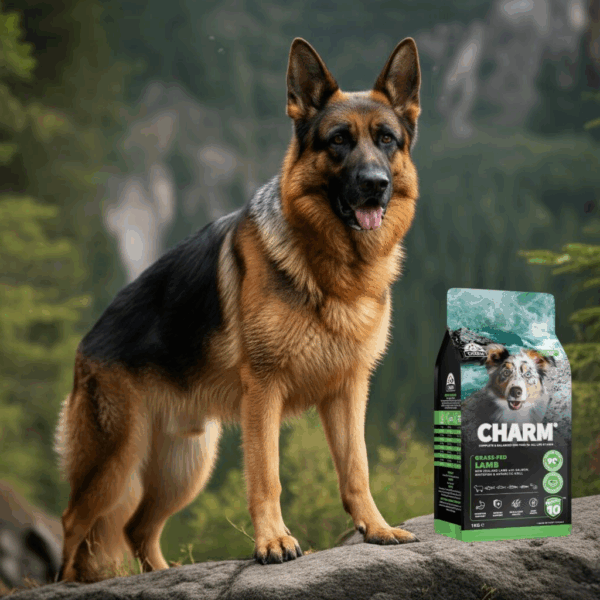
Pick nutritious food that your dog loves, aligns with your goals (weight, performance, sensitivity), and helps your German Shepherd stay athletic while promoting a healthy coat, a strong immune system, and good digestion.
Senior German Shepherd Nutrition – Helping Your Dog Age Well
Senior Dog Digestion and Mobility Needs
When German Shepherds are known to reach 7–8 years, their metabolism slows and weight control becomes critical. A senior adult dog food plan should keep them lean to protect joints. Arthritis and mobility issues are common, so dog nutrition with glucosamine and collagen helps. Senior dogs also need food that’s easy to digest, ensuring they absorb key nutrients from their food without strain. Proper dog health support keeps aging Shepherds comfortable.
Best Food for a German Senior Dog: Options with Joint and Brain Support
The best Shepherd adult dry dog food for seniors includes joint-supporting ingredients and higher fiber for digestion. These food options often contain fewer calories and higher fiber to help with weight management and digestion. Look for foods with added joint support, like collagen and glucosamine, to help maintain mobility and comfort.
Brain health is another important consideration. Ingredients rich in antioxidants and omega-3 fatty acids, like those found in krill oil, that food help support cognitive function in a senior dog. Some studies have even explored the role of specialized diets in canine neurological health, showing how targeted nutrition can be beneficial. Providing a diet tailored to these needs helps your loyal companion age gracefully and comfortably.
Fruits, Grains, and Extras in a German Shepherd’s Diet
Which Fruit is Best for a German Shepherd?
While a German Shepherd’s diet should be primarily meat-based, certain fruits can be a healthy, low-calorie treat in moderation. The best fruits are those rich in antioxidants and vitamins. Blueberries and cranberries are excellent choices; they are low in sugar and packed with antioxidants that boost the immune system. These are often included in high-quality dog food formulas for their functional benefits.
Other safe fruits include apple slices (with seeds and core removed), strawberries, and watermelon. However, these should only make up a small fraction of your dog’s daily food intake. It is critical to avoid toxic fruits like grapes and raisins, which can cause severe kidney failure in dogs.
How to Balance Fruits, Grains, and Protein?
The cornerstone of a German Shepherd’s diet should always be high-quality animal protein. As carnivores, they are optimized to derive their energy and nutrients from meat. Fruits and vegetables can provide beneficial vitamins and fiber but should be considered supplementary. The ideal balance is a diet that is high in protein, moderate in healthy fats, and very low in carbohydrates.
Regarding grains, it’s important to adhere to a food philosophy that recognizes carnivores don’t need grains or carbs to thrive. Grains like corn, wheat, and even rice can be difficult for some dogs to digest and are often used as cheap fillers in lower-quality dog food. A dry dog food that is grain-free diet focusing on animal protein and functional, low-glycemic ingredients is a superior option for the health of your German Shepherd.
Feeding Schedule – How to Feed Your German Shepherd Correctly
How Much Should a German Shepherd Weigh?
Healthy males weigh 65–90 lbs, females 50–70 lbs. Weight management is key for German Shepherd health, as excess pounds strain hips and joints. A lean body condition is the best diet goal, not just numbers. Monitoring how much dog weigh and adjusting portions keeps the pure breed dog agile and strong.
Feeding Frequency and Portion Control
Feed two meals daily instead of free-feeding. This practice supports digestion and lowers risk of bloat in large breed dogs. Following feeding guides on the packaging is a good start, but adjust portions as needed to keep your dog fit. A German Shepherd owner must observe activity level and metabolism—feeding a sport dog differs from a family pet. Proper portion control providing your German Shepherd with steady energy.
How Many Bowls of Water Should a German Shepherd Drink?
A German Shepherd typically needs one ounce of water per pound daily. For an 80-lb German Shepherd dog, that’s about 10 cups. Hydration depends on whether you use wet dog food or kibble. This amount can also increase depending on the weather and exercise level. Always help your dog stay hydrated, as water is essential for dog health, digestion, and circulation.
Tips for Choosing the Best Food for Your German Shepherd
How to Choose the Best Food Brand?
Choosing a brand is simpler than it seems: ignore hype, verify named proteins, and favor high-animal-protein, low-carb formulas. Pick makers who disclose sourcing (grass-fed beef, cage-free chicken). CHARM® Pet Food focuses on fresh meat and functional ingredients—an option for German Shepherds that value clarity and quality. If your dog has allergies or sensitivities, transparent labels help you spot triggers tied to food allergies. Choose from brands of dog food that publish sourcing and testing data.
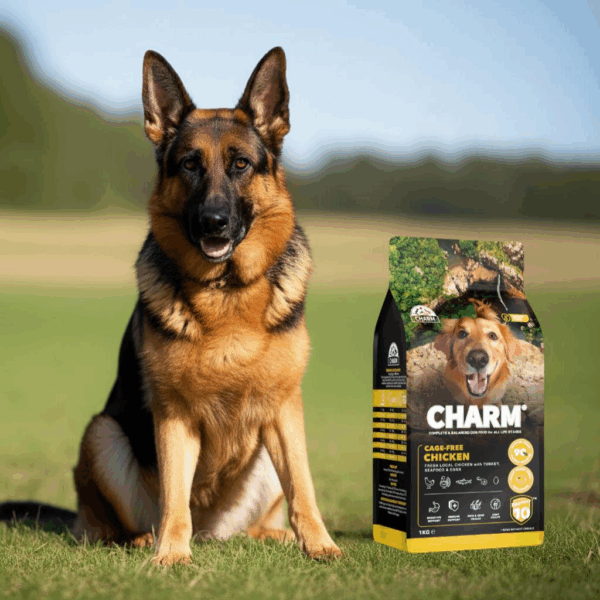
Key Considerations: Breed Size, Activity Level
As a large breed, joints and digestion come first; select formulas built for size and age, then match calories to activity—working dogs need energy-dense meals, couch companions need less. Two measured meals aid weight control. When deciding which food is best across brands of dog food, start with life stage, size, and daily workload. These factors will guide not only the type of food you choose but also the amount you feed. Always providing your dog with a diet that matches their energy output is key to their long-term health. With a single all-life-stages formula, you can meet needs at every age and simply adjust portion sizes and feeding frequency to match activity and condition.
Choosing the Best Dog Foods for Long-term Health
Choosing the best dog food is a long-term investment in your German Shepherd’s health. Look for dog food products that go beyond basic nutrition and include beneficial supplements. Ingredients like krill oil for omega-3s, collagen peptides for joints, and functional mushrooms like reishi for immune support can make a significant difference over your dog’s lifetime.
Avoid recipes where starch dominates, such as potato recipe dry dog food, and instead choose ones built on high-quality animal protein.
Prioritize nutrient-dense meals that deliver what German Shepherds deserve: steady energy, mobility, and a strong lifespan.
FAQ – Common Questions About German Shepherd Food & Care
1. What is the absolute best food to feed a German Shepherd?
The best dog food for German Shepherds is a high-protein, low-carbohydrate formula made with high-quality, named meat sources like beef, chicken, or lamb. Although nutritional needs can shift as dogs grow, a complete and balanced recipe formulated for all life stages ensures full nutrition at every age and should be free of grains and unnecessary fillers. A brand like CHARM® Pet Food, which offers recipes such as its Grass-Fed Beef, an ideal Shepherd adult dry dog food, aligns perfectly with these principles and helps ensure your German Shepherd receives balanced nutrition.
2. Is a grain-free diet necessary for German Shepherds?
While not every dog requires a grain-free diet, it is highly beneficial for this dog breed. German Shepherds are known for digestive sensitivities, and since carnivores don’t need carbs to thrive, grain-free German Shepherd food focuses nutrition on what their bodies use best: animal protein and healthy fats.
3. How much protein does an active German Shepherd need daily?
An active adult German Shepherds need a diet with a protein content of at least 24-26% on a dry matter basis. A working dog or a highly athletic dog like this pure breed dog might benefit from even higher levels to support muscle repair and energy.
4. Can German Shepherds eat raw chicken or beef?
While some German Shepherd owners choose a raw diet, it’s important to be aware of potential risks such as bacterial contamination and nutritional imbalance. A safer alternative is dry dog food is designed to use these meats in a cooked, balanced, and digestible form. If you do offer appropriate raw food, consult a veterinary nutritionist to help your German Shepherd stay healthy.
5. How can I tell if my German Shepherd has a food sensitivity?
Signs of food allergies can include itchy skin, chronic ear infections, a dull coat, loose stools, or vomiting. If your dog has allergies, consult your vet. CHARM® Pet Food recipes emphasize high-quality proteins, an option for German Shepherds that supports gut balance and German Shepherd health.
6. Are fruits like blueberries and cranberries good for German Shepherds?
Yes, in moderation. These fruits are excellent sources of antioxidants and are often included in premium dog food for their immune-boosting properties. Treats like these are beneficial provided your dog consumes them sparingly, as food is best when balanced with protein and fats.
7. How many times a day should I feed my German Shepherd to prevent bloat?
It is recommended to feed your German Shepherd two smaller, measured meals per day instead of one large one. This practice can aid digestion, reduce risk of bloat, and respect the needs of your German Shepherd for steady energy.
8. What specific ingredients support joint health in German Shepherds?
Look for ingredients like glucosamine hydrochloride and collagen peptides. These components are vital for maintaining cartilage and joint fluid, which is crucial for a breed of dog like the German Shepherd. Quality types of food that add these nutrients can significantly help your German Shepherd maintain mobility.
9. Is wet food or dry food better for a German Shepherd’s teeth?
Wet dog food is softer, but dry dog food is designed to help scrape plaque and tartar, promoting cleaner teeth and healthier gums. For dental health, choosing the best dog food that offers kibble with the right texture is key to long-term care.
10. What human foods are most dangerous for German Shepherds?
Several human foods are toxic to a breed of dog like German Shepherds, including chocolate, grapes, raisins, onions, garlic, macadamia nuts, and anything containing the artificial sweetener xylitol. Always ensure your German Shepherd receives safe meals from premium pet food sources, not table scraps.
11. Why is my German Shepherd’s coat dull, and can food help?
A dull coat is often a sign of a nutritional deficiency, particularly in essential fatty acids. A premium dog food rich in Omega-3s from krill oil can improve skin and coat health. Balanced food for a German Shepherd helps restore shine and vitality, showing why German Shepherds deserve the best diet tailored to their needs.
12. How do I properly switch my German Shepherd to a new dog food?
Transition to a right dog food gradually over 7-10 days. Start by mixing a small amount of the new food (25%) with the old food (75%), and slowly increase the proportion. This slow change respects the needs of your German Shepherd and reduces risks of stomach upset in this dog breed.
13. Are ingredients like mushrooms beneficial in dog food?
Yes, certain functional mushrooms like reishi, turkey tail, and chaga are considered superfoods. They provide antioxidants and immune support. When food contains these extras in a premium pet food, it can help your German Shepherd maintain resilience, which is why choosing the best dog food matters long-term.
14. Can German Shepherds eat rice?
While plain rice is not toxic, it is a high-glycemic carbohydrate that is not necessary in German Shepherd food. Better alternatives include lentils or chickpeas, or nutrient-rich blends. These are healthier types of food for this pure breed dog.
15. Do German Shepherds have sensitive stomachs?
This is a common concern among owners, as German Shepherds can be prone to particular digestive needs. The breed is predisposed to certain digestive conditions, such as Exocrine Pancreatic Insufficiency, which makes a highly digestible diet essential. Issues often arise when their food contains hard-to-digest fillers or ingredients that don’t align with their needs as carnivores.
To support a healthy digestive system, it is crucial to provide a diet that is rich in high-quality animal protein and free from common irritants like grains. Choosing a food with functional ingredients known to aid digestion, such as pineapple and spinach, can be highly beneficial. The focus should always be on providing a nutrient-dense, species-appropriate diet to ensure your German Shepherd’s gut stays healthy.
16. How often do you bathe German Shepherds?
German Shepherds, with their distinctive double coat, do not need to be bathed very often. In fact, over-bathing can be detrimental, as it strips the natural oils that protect their skin and keep their coat healthy and weather-resistant. A good rule of thumb is to bathe your German Shepherd only when they are visibly dirty or have a noticeable odor, which for most is no more than once every 3-4 months.
While bathing frequency is important, the true foundation of a healthy, shiny coat comes from within. A proper diet rich in essential fatty acids, such as Omega-3s from a high-quality source like krill oil, is the most effective way to ensure their skin is nourished and their coat is vibrant. Excellent nutrition will do more for their coat health than any grooming schedule. This is one more reason every dog, especially like German Shepherds, benefits from a nutrition-first approach.
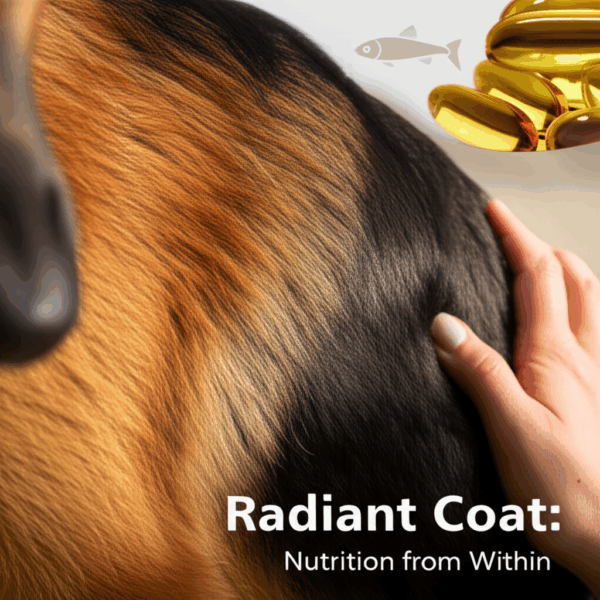
Final Summary – Best Food for German Shepherds at a Glance
Finding the best food for your German Shepherd is one of the most important responsibilities you have as an owner. Their majestic build, sharp intellect, and unwavering loyalty deserve a diet that fuels their body and protects their health for the long haul. Remember that the right dog food is an investment in a longer, happier life with your incredible companion!
Key Takeaways:
- All-life-stages completeness: A single, balanced recipe formulated for all life stages provides complete nutrition throughout your dog’s entire journey—from energetic puppies and active adult German Shepherds to wise senior dogs. Simply adjust portions and feeding frequency per the package guide.
- Prioritize High-Quality Protein: Meats like beef, chicken, lamb, and duck should be the foundation of their diet. A high-animal-protein, low-carb food like those from CHARM® Pet Food is ideal.
- Support Breed-Specific Needs: German Shepherds require targeted support for their joints and digestion. Look for food with added glucosamine, collagen, and digestible ingredients.
- Fruits and Grains in Moderation: Safe fruits can be healthy treats, but a grain-free diet is often the best choice for this breed’s overall digestive health. Remember, carnivores don’t need carbs to thrive.
- Hydration and a structured feeding schedule are as important as food quality: Always provide fresh water and feed two measured meals a day to promote good health and reduce the risk of bloat.
We invite you to explore the range of CHARM® Pet Food options, from our Cage-Free Chicken Dry food to our Grass-Fed Lamb Dry food, and discover the difference that a thoughtfully crafted, species-appropriate diet can make for your German Shepherd.



